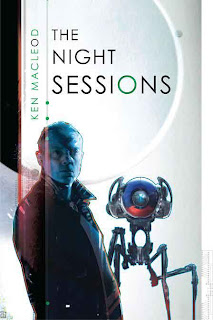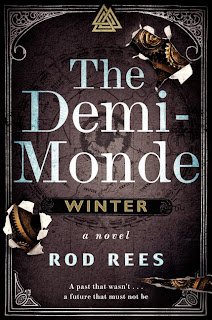

The Night Sessions: Pyr trade paperback, April 2012, 261 pages, cover art by Stephan Martiniere. Ken MacLeod is a four-time Hugo nominee, has been nominated for the Nebula and Clarke and a host of other awards, and three times has won the British Science Fiction Award, including a best novel award in 2009 for The Night Sessions. Given MacLeod's stellar record and the strong reception The Night Sessions received when published in England, we named this one of our four "seeded" novels for the Spring 2012 Battle of the Books.
The opening prologue of The Night Sessions follows John Richard Campbell, a Christian fundamentalist traveling from New Zealand to Scotland to meet some like-minded people. His trip takes him past highs and lows of the future: an amazing space elevator, and a sea of glass where Los Angeles used to be. We have also just met Detective Inspector Adam Ferguson and his robot sidekick, who (the book cover suggests) will be investigating a terrorist bombing, possibly carried out by militant atheists.
The Demi-Monde: Winter: William Morrow hardcover, January 2012, 505 pages, cover design by James Iacobelli. This is Rod Rees's first novel and the first in a projected tetralogy of Demi-Monde books. I've seen it billed as steampunk, but as far as I can tell the steampunk elements all take place within a computer-generated virtual reality, so to me that's science fiction.
The Demi-Monde: Winter opens with Norma, daughter of the POTUS, trapped within a dismal virtual reality world, peopled with cyber-duplicates ("dupes") of awful tyrants from history. The game runs on a quantum computer system regrettably called "ABBA"--I had to read this with "Waterloo" and "Mamma Mia" running through my head--which functions rather too well. The Army created this simulation to train soldiers in urban warfare, but the villains in the game possess artificial intelligence, and they apparently have designs on the real world. For reasons only hinted at so far, the Army has recruited a young musician named Ella to go into the Demi-Monde to rescue the President's daughter.
The Battle: When we started the Battle of the Books, I expected that the format would favor books that begin with an action sequence. So far that's not proving the case. Instead, the first round is largely about building credibility, getting me to trust that I'm in the hands of a gifted storyteller.
Nearly all of the first 25 pages of The Night Sessions consist of a low-key prologue, with no action at all. But in those pages, MacLeod accomplishes two very important objectives: first, he presents an interesting future, in which a religious war in the Middle East has triggered a backlash against any religion in politics in the West:
Campbell could see more clearly than ever why people in Britain, the US, and their former allies used the expression "Faith Wars" for what everyone else referred to as the Oil Wars. Calling the catastrophes of the first two decades of the century the Faith Wars was the only way the former coalition countries could kid themselves they had won. They'd certainly defeated militant Islam, with secular republics now implanted throughout the Middle East. The Israel-Palestine issue could be regarded as solved, at least until the radiation dropped to a level that made the territory worth fighting over again.Second, MacLeod shows me some nice characterization. The first thing he tells us about Campbell is his belief in young earth creationism, a quick way to make him contemptible in the eyes of most science fiction readers. But in the following scenes, we find Campbell remarkably good-natured and scrupulously honest. I don't know if he will continue to be an important character, but even if not, MacLeod's even-handed treatment of him bodes well for the novel as a whole.
In every other respect, the US and UK had been defeated: armies destroyed, economies bankrupted . . . The main internal political consequence was the Great Rejection, in which the religious factions who'd pushed for the war had had the unwelcome experience of seeing a nasty gleam in the eyes of the returning veterans, a little glint that said: You're next!
In contrast, The Demi-Monde: Winter opens in media res, with a character racing from fierce dog-like creatures and evil villains. The story seems promising enough, but Rees does not instill confidence that he is going to tell it especially well. For instance, even through action sequences, he overloads his prose with linking verbs:
The guy was obviously mega-tense, which was odd because it was Ella who was being interviewed for the gig. It was Ella who had exactly twelve dollars in her pocket and rent of fifty dollars due tomorrow. It was Ella who would be living on air pie for the rest of the week.Rees's sentences rely heavily on adjectives and adverbs, often pairing two at a time, or simply repeating the same one: "that hideous, hideous man"/"totally, totally wrong"/"evil, evil bastards"/"she really, really needed the gig." But writing is not blackjack--doubling down adds no impact.
And more to the point it was the general who was asking all the questions. But oddly he was the one who was uptight.
To overcome these stylistic quirks, Rees has to convince me his story involves strong characters in a very interesting future conflict. But in contrast to the nuanced presentation of Campbell in The Night Sessions, through the opening pages The Demi-Monde's characters come across as black-and-white, particularly the cartoonishly evil villains inside the simulation.
Moreover, the opening sequences do not show us the virtual reality technology at the heart of the story in a convincing way. We see the President's daughter running through the Demi-Monde, which she is aware is a VR construct, but strangely she doesn't treat it that way. She seems to think of the villains chasing her as real people, not as computer simulations. She allows exhaustion and a series of scrapes and bruises to stop her, when she must know her real body is not injured or fatigued. Most importantly, we are told she is literally racing for her life, because if you die in the Demi-Monde, your real body dies as well. Huh? In a VR system supposedly developed to train soldiers, that seems like a pretty serious bug. Maybe Rees explains this later, but it's such an unlikely but important plot element, he should have taken a couple lines to justify it from the outset.
The Demi-Monde: Winter has been generally well-received, so I suspect it develops into an interesting story. But after 25 pages, I have much more confidence in where Ken MacLeod is taking The Night Sessions.
THE WINNER: THE NIGHT SESSIONS by Ken MacLeod
The Night Sessions advances to face either Simon Bestwick's The Faceless or Jon Sprunk's Shadow's Master in the second round.
To see the whole bracket, click here.

No comments:
Post a Comment